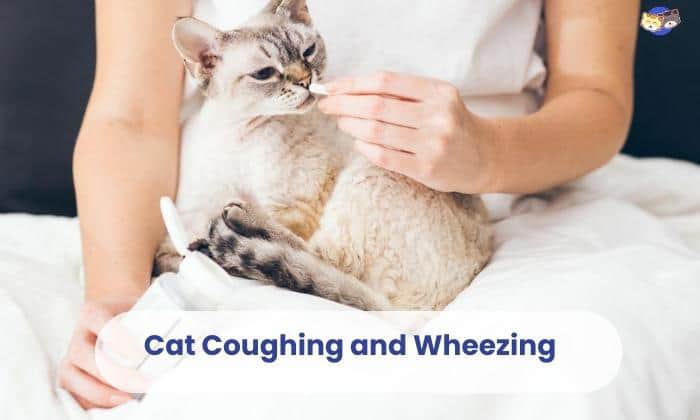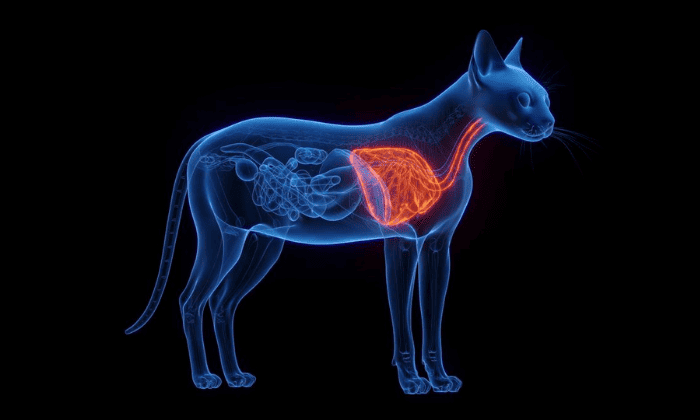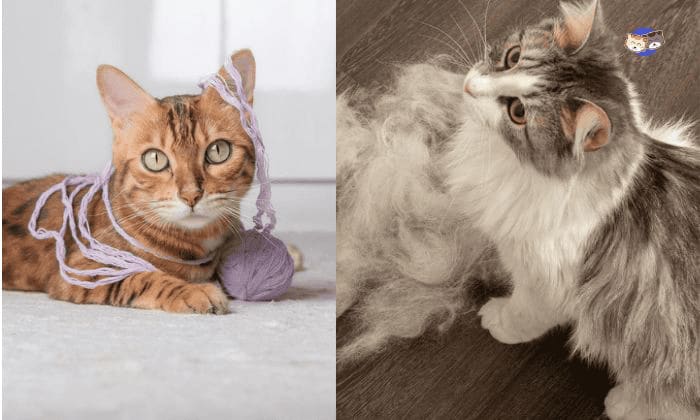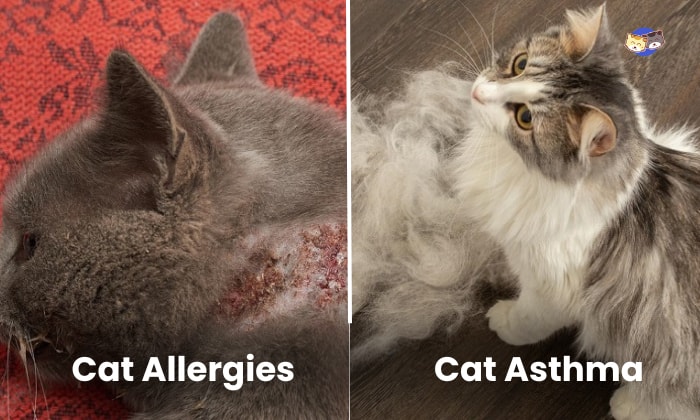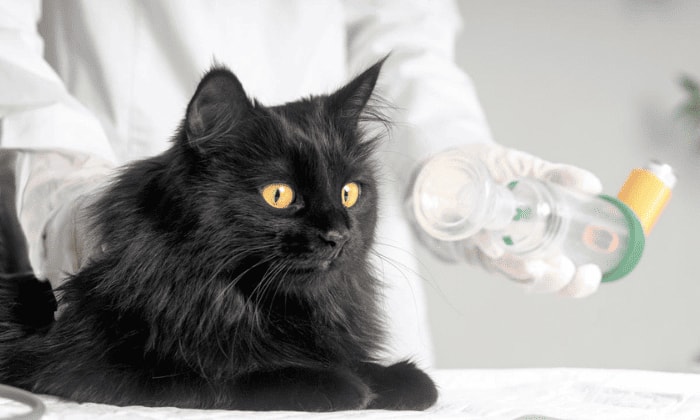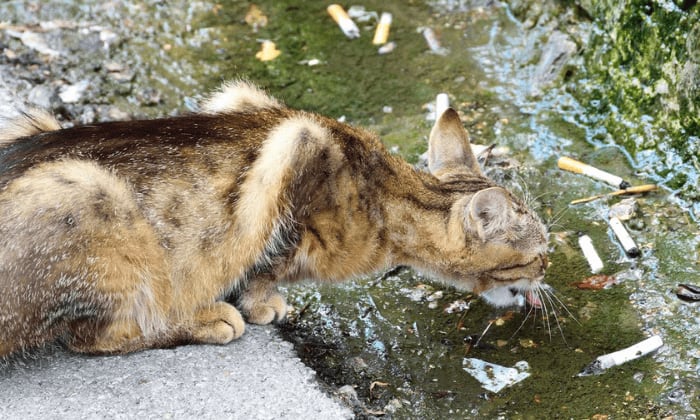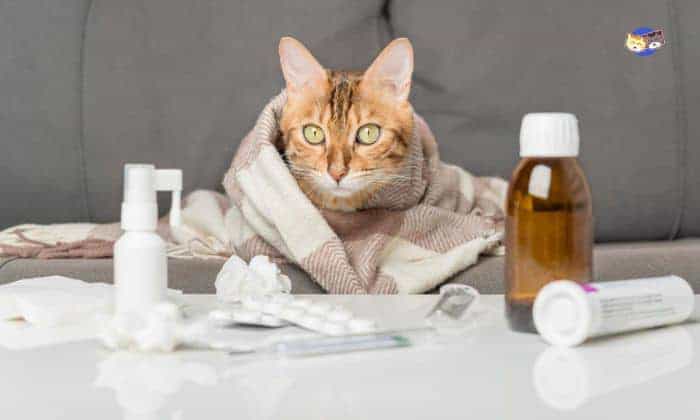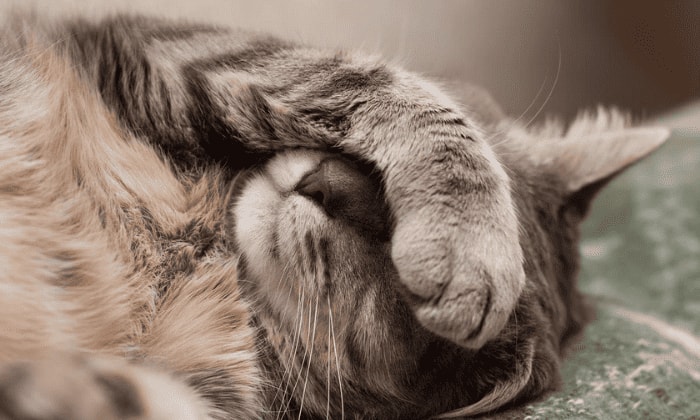Table of Contents
Is your cherished feline companion manifesting a concerning pattern of unexpected coughs and wheezes? There are several possible reasons for these symptoms.
Cats may cough and wheeze when their “coughing receptors” in the pharynx, larynx, trachea, and bronchi become irritated. It could be due to respiratory infections, allergies, asthma, or even hairballs.
To understand further the various mechanisms behind your cat’s discomfort, in this article, we will explore the fascinating world of feline health and determine the potential causes of why is my cat coughing and wheezing, discuss treatment options, and offer insights into when you should seek veterinary attention.
Coughing in Cats
Aside from humans, coughing is also a reflex action in cats and acts as a protective mechanism to expel particles, irritants, and microbes from their airways.
It is typically a symptom of an underlying condition rather than a primary disease. Coughing in cats often signals an inflammatory condition impacting the lower respiratory tract, primarily associated with bronchitis.
What Causes?
So what causes a cat coughing a lot? Coughing and wheezing in cats can be attributed to various factors, including:
1. Foreign Objects or Hairballs
Seeing your feline bud coughing and gagging can sometimes be attributed to airway obstructions, with foreign objects and hairballs being common triggers.
When cats accidentally ingest foreign objects like small toys, string, or even fragments of food, these objects can become lodged in their airway, causing irritation and obstruction.
However, take note that there is a difference between cat cough and hairball. A cat cough, as a reflex action, also gives off a hoarse sound or cat hacking cough sound.
Meanwhile, a hairball is a mass of hair that forms in the digestive tract and is typically expelled through vomiting.
2. Respiratory Infections
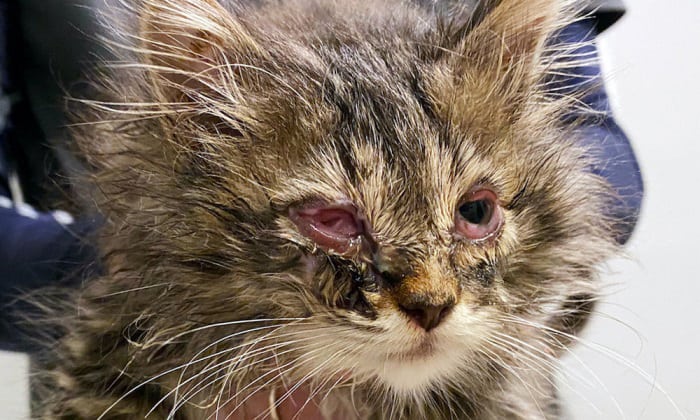
The most common viruses involved in feline respiratory infections are feline herpesvirus (FHV-1) and feline calicivirus (FCV) (See also Bordetella).
When a cat becomes infected, the virus or bacteria can target the lining of the respiratory tract, including the nasal passages, throat, and lungs.
This can result in inflammation, swelling, and increased mucus production, leading to symptoms such as coughing, sneezing, and wheezing.
3. Allergies and Asthma
Sensitivity to various allergens, including pollen, dust mites, or certain foods, can also trigger a cascade of respiratory distress.
This hypersensitivity can sometimes lead to inflammation in the airways, resulting in your cat suddenly wheezing or coughing.
Moreover, keep a keen eye out also for rapid breathing, vomiting, and lethargy in your furry companion. These symptoms may suggest a possibility that your cat is battling with asthma.
To find triggers and reduce exposure, allergen testing is advised. And in cases of food allergies, a veterinarian may recommend a special hypoallergenic diet or an elimination diet to identify the specific food trigger.
The same with having an allergy, feline asthma can strike, leading to inflammation in their airways. While there is no known cure for feline asthma, medications, injections, and inhalers can help manage the symptoms.
4. Heart Disease
Certain heart conditions can disrupt the normal functioning of your feline’s cardiovascular system and potentially result in fluid accumulation in the lungs, a condition known as pulmonary edema.
When the heart is compromised, it struggles to effectively pump blood throughout the body, leading to increased pressure within the blood vessels of the lungs.
As a result, the lungs become congested, making it difficult for cats when breathing properly, hence, giving you a concerning cat coughing sound or a cat wheezing sound.
5. Environmental Factors
Smoke, whether from cigarettes, candles, or fires, and exposure to strong perfumes, household cleaners, or chemicals, can also be a significant irritant for cats.
The inhalation of smoke and other chemical particles can lead to inflammation of the airways, triggering coughing and wheezing.
These substances may release volatile compounds that irritate the respiratory tract, causing discomfort and breathing difficulties.
How to Treat It?
Essentially, the very first step to treat and help a wheezing cat is through veterinary interventions and examination, and medications as prescribed by the vet.
Aside from that, you may also utilize a few home remedies that may offer temporary relief and support your cat’s respiratory health such as:
- Adding a humidifier to your cat’s environment and clean living space
- Steam therapy
- Elevated sleeping area to reduce exposure to irritants that may settle on the ground
- Proper hydration
- Ensuring your cat is on a balanced and nutritious diet
Still, it’s important to note that while these home remedies may provide temporary relief, they are not substitutes for professional veterinary care.
Always consult with a veterinarian for a proper diagnosis and to develop an effective treatment plan for your cat’s coughing and wheezing.
When Should I Be Concerned?
While an occasional bout of coughing and wheezing in cats may not be cause for immediate alarm, certain signs should raise concern and prompt veterinary attention:
- Persistent or worsening symptoms
- Difficulty breathing or rapid breathing
- Bluish gums or tongue
- Loss of appetite, lethargy, or weight loss
If you observe any of these signs, do not hesitate to seek immediate veterinary attention. Timely intervention can help identify the underlying cause and provide the necessary treatment to ensure the well-being of your beloved feline companion.
Frequently Asked Questions
What is the difference between a kitten coughing and an elderly cat coughing?
The main difference is related to the potential underlying causes and age-related factors. Wheezing in kittens is more susceptible to respiratory infections, parasitic infections, and congenital issues, while elderly cats are prone to age-related conditions, dental disease, weakened immune systems, and respiratory conditions.
Why is my cat coughing with tongue out?
If your cat is coughing with its tongue out, it could indicate a more severe respiratory issue or an obstruction in the airway. This behavior may imply feline distress and immediate veterinary attention is recommended.
Why is my cat coughing when sleeping?
Even during the night or sleeping time, coughing in cats can still be caused by various factors such as hairballs, respiratory infections, allergies, or asthma.
What does it mean when my cat is coughing without a hairball?
Feline coughing with no hairball could indicate asthma or other underlying medical and health issues. If the coughing continues with other concerning symptoms, it is important to consult a veterinarian for an appropriate diagnosis and proper treatment.
Can I use over the counter cough medicine for my cat?
It is not recommended to give human cough medicine to cats without veterinary guidance, as some ingredients can be harmful to them.
Conclusion
In summary, there are indeed several potential causes for these respiratory symptoms. However, by teaming up with your veterinarian and gaining insights into the root causes, you become the superhero in your cat’s health journey!
Armed with knowledge and armed with love, you can provide the care and support needed to help them, ensuring a future filled with playful pounces, cozy cuddles, and many heartwarming moments with your feline fur buddy!
We hope this article has somehow helped you in answering your little Whisker’s distress: “why is my cat coughing and wheezing?” Until next time dear fur parent!

I am Amy Sawy, a Doctor of Veterinary Medicine (DVM) graduate from the University of Kansas. y husband, Dr. Plummer, and I own a veterinary clinic in Phillipsburg, Kansas. In addition to my professional background, I am a devoted pet owner myself, with a household that includes dogs, rodents, and most notably, cats – a total of five felines in my home.
In 2020, I joined an organization as a professional writer, leveraging my experience and collaborating with my team to deliver the most valuable information for your cat’s care.


